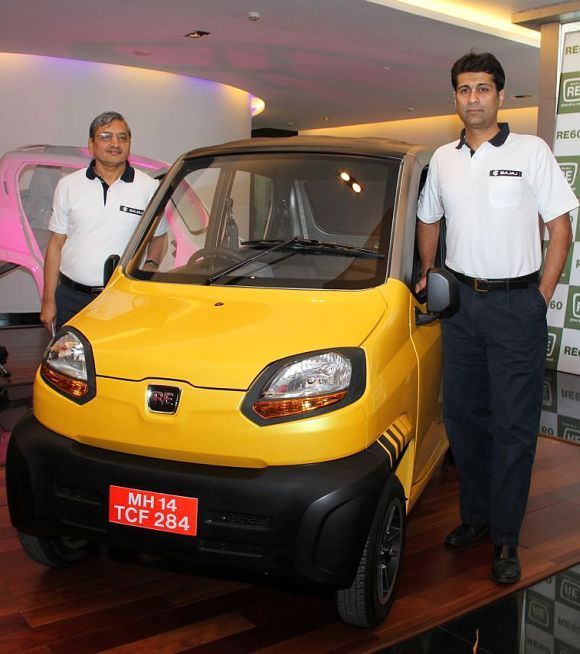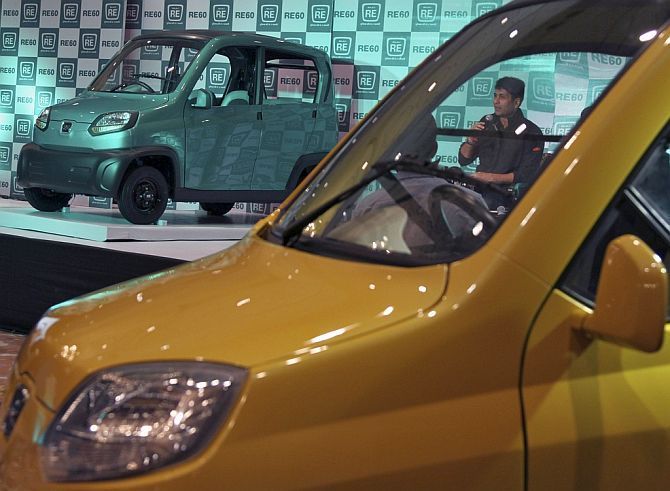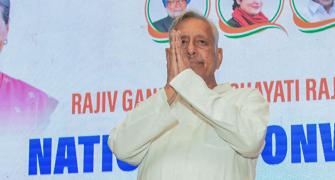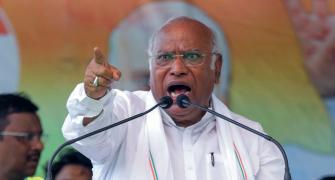
At present, there are many vehicles that weigh close to the proposed increased weight of 600 kg.
The battle over norms for quadricycles has taken a bitter turn, with Bajaj Auto Managing Director Rajiv Bajaj lashing out at some leading automobile companies for approaching the government with a plea to increase the cap on these vehicles' weight from 450 kg to 600 kg.
Bajaj Auto is the country's only automobile manufacturer that already has a product meeting the specifications laid down by the government for quadricycles - the RE60, which is ready for commercial launch.
At present, there are many vehicles, such as the commercial four-wheeler Tata Magic Iris (with a kerb weight of 685 kg), that weigh close to the proposed increased weight of 600 kg.
A decision on whether or not there should be an increase in the earlier notification on weight cap for quadricycles is likely to be taken soon, after a meeting between representatives of the road transport ministry and some automobile companies this week.
The government, under a notification, had allowed such vehicles to ply on roads from October 1.

Making a strong plea against any increase in the specified weight, Bajaj said: "Increasing the cap to 600 kg will defeat the purpose of upgrading from three-wheelers, which weigh 350 kg. And, more importantly, it will destabilise cars and prove an underhand attempt to discredit the quadricycle."
He added a move to raise the limit would be unfair for cars. Some cars weighed around 700 kg - the Maruti Alto weighs 695 to 725 kg - but had to go through a host of rigorous tests, including crash tests, to ensure safety. Quadricycles did not have to go through those, he said.
Bajaj further argued: "An increased weight will also work against quadricycles' pitch as a category for those wanting greener products. A heavier vehicle, understandably, will be less fuel efficient and fail to meet the exacting carbon dioxide norms that we have offered in the RE60."
Besides, though the maximum speed for vehicles would be 70 km per hour (the norm for quadricycles), the heavier ones would move at much slower speeds, increasing congestion in cities, Bajaj said.

Quadricycles have drawn many varied views from automobile companies. Tata Motors, for example, has openly raised questions on introduction of such vehicles.
When the government gave its green signal to the policy governing these vehicles, Tata Motors' then managing director, Karl Slym, had tweeted: "The government and industry have been accelerating efforts in traffic safety and environment; now we consider a quadricycle. Why go backwards?"
To Business Standard's emailed query on whether the company would push for an increase in cap on weight of quadricycles to 600 kg, a spokesperson for Tata Motors pointed out: "At Tata Motors, we remain committed to people's safety, as well as rigorous and consistent emission norms. Our stand on these issues is based on our belief that there must be a careful evaluation of the best way to consider transport needs - with the right degree of safety and emission standards, as well as ensuring fair participation from all stakeholders."
He added the industry had made significant investments in complying with the safety and emission norms in line with the government's 2005 decision.

"In keeping with global standards, we should strive to further the evolution of safety and emission norms and not allow a hasty regression," the spokesperson added.
He said Tata Motors remained committed to working closely with the government, industry and other stakeholders for a meaningful discussion and participation in new initiatives.
Vishnu Mathur, director-general of the Society of Indian Automobile Manufacturers (SIAM), declined to comment on the issue.
But a senior executive of a two-wheeler company that is working on a similar vehicle said: "There is a car company that is interested in getting a provision for diesel engines added to the norms. A diesel engine will increase a vehicle's weight. Currently, only two-wheeler companies like Hero MotoCorp and TVS deal in small petrol engines, which are seen in their two-wheelers. Bajaj's RE60 is also powered by a 150-cc engine."

The government notification in respect of quadricycles has been challenged by individuals in courts. While some of the petitions have been dismissed, the Karnataka High Court is scheduled to hear a case in this regard on November 10.
The policy allows these vehicles for commercial purposes if they operate within the limits of cities and have a maximum speed of 70 km an hour.
In a quandary
Rules laid down while allowing quadricycles from October 1:
- Can be used only for commercial purposes
- To be driven within municipal limits; not allowed on highways
- List of materials that cannot be used to construct a quadricycle include rexine, cloth and flexible plastic
- A vehicle should have a large and visible 'Q' badge on the front
- Top speed restricted to 70 kmph
- A passenger quadricycle must have seating for four, including the driver
- A goods quadricycle must seat two passengers, including the driver
- A passenger vehicle's gross weight must not exceed 450 kg
- A goods quadricycle can weigh a maximum of 550 kg










